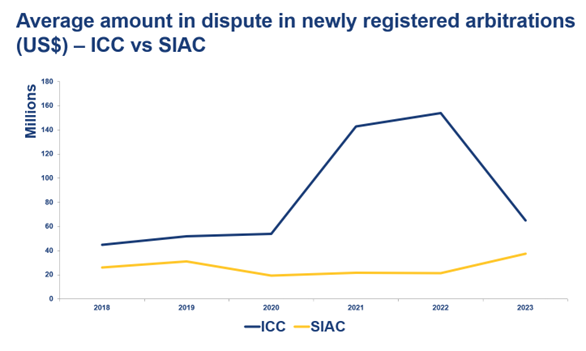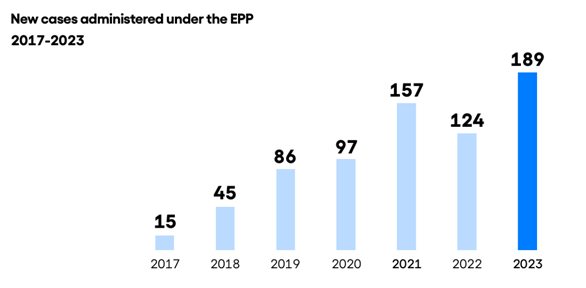The International Chamber of Commerce (ICC) recently published its arbitration and ADR statistics for 2023.1 The detailed reports for 2021 and 2022 are also now available on the ICC's website, after some delay. The data shows that the ICC remains the leading arbitral institution by volume of cases, with a global reach. Users of ICC arbitration in 2023 came from 141 countries, and construction and energy sectors continued to generate the largest number of cases in 2021-2023.
Caseload and amounts in dispute:
- The ICC registered 890 new arbitrations in 2023, the third highest number in its history (after 966 in 2016 and 946 in 2020).

- The construction and energy sectors continued to generate the largest number of cases in 2023, together accounting for just over 45% of all new cases registered, or 25.2% and 20.6% of new cases respectively. This is in line with previous years, where the construction and energy sectors generated 45% of new cases in 2022 and 44% of new cases in 2021.
- The average amount in dispute in 2023 filings was $65 million, and the aggregate amount in dispute reached $53 billion. These figures are markedly lower than in 2022 and 2021: in 2022, the average amount in dispute was $154 million; in 2021, the average amount was $143 million, and the aggregate amount in dispute was $113 billion. This reflects a return to the ICC's average pre-pandemic figures.

- 39.5% of new arbitrations in 2023 (38% in 2022 and 37% in 2021) fell within the $3 million limit for application of the opt-out expedited procedure (prior to 2021, the limit was $2 million and in 2020, 31.1% of new cases fell within that limit) – suggesting there is ample room for use of that procedure.
Global Reach
- Parties from 141 countries and independent territories participated in arbitrations filed in 2023, as compared with 134 in 2022 and 143 in 2021.
- The ICC's global reach continues to exceed that of other leading global institutions. For example, parties filing HKIAC arbitrations in 2023 were from 45 jurisdictions, and parties opting to arbitrate at SIAC were from 66 jurisdictions.
- Just over 40% of all parties at the ICC in 2023 came from Europe, 24% from Asia and the Pacific, 15% from Latin America, 13% from North America and 8% from Africa. There were increases in parties from Central and Eastern Europe, North America and the Middle East in particular – though, as in 2022 and 2021, the US represented the highest number of parties for arbitrations filed at the ICC (10.8% in 2023).
- In terms of seat, 2023 remained unchanged from 2022: the top five countries for seat were (in descending order) France, the UK, Switzerland, the US, and Brazil. This presents a shift from 2021, where the UK was selected more frequently than France, and Singapore was the fifth most popular choice.
- In 2023, the ICC Court exercised its power to fix the place of arbitration in 8% of all cases.
Arbitrator diversity
- In 2023, the 935 appointed2 arbitrators came from 89 jurisdictions (as compared with 901 arbitrators from 90 jurisdictions in 2022 and 1,060 arbitrators from 99 jurisdictions in 2021).
- Some jurisdictions remain far more heavily represented than others. The UK was the most common arbitrator nationality across 2021, 2022 and 2023 (16.7%, 14.8%, and 13% of appointments respectively). Whilst those figures show a slight decline in the regularity of appointing arbitrators of UK nationality, there is still a noticeable gap between the next most regularly appointed nationalities in 2023 (France 8.5%; Switzerland 7.9%; US 7.4%; Germany 6.4%; Brazil and Spain each on 4.5%).
- In 2023, the average age of arbitrators was 55. As in previous years, 38% of arbitrators were below 50.
- According to the ICC, "[a]rbitrators appointed by the ICC Court (directly or following a proposal by an ICC national committee) were five years younger than the global average".
- The ICC appointed a greater proportion of female arbitrators compared to the proportion of nominations of female arbitrators made by parties – in 2023, 41% of the arbitrators it appointed were female. Overall, female appointments continue to increase, albeit slowly: 24.3% in 2021, 28.6% in 2022, and 29.7% in 2023.

- The 2023 statistics also include a breakdown of the proportion of women performing the different roles of an arbitrator:

Arbitrator challenges
- Consistent with previous years, the 2023 statistics suggest that few challenges to an arbitrator's alleged lack of impartiality, independence or otherwise succeed. In 2023, only eight out of 46 challenges were accepted; in 2022, only three out of 52 challenges were accepted; in 2021, only five out of 45 challenges.
- The total number of challenge applications remains high compared to other institutions: for example, in 2023 only five challenges to arbitrators were submitted to the HKIAC, and in 2022, none to the LCIA (see here and here for more detail, respectively).
Emergency and expedited procedures
- In 2023, 28 emergency arbitrator applications were filed. This is down from the 36 applications filed in 2022 (and in line with the 27 filed in 2021), but overall, still reflects that the emergency arbitrator rules remain popular.
- The 2023 statistics show that emergency measure requests are more likely to be dismissed than fully granted - though a third of requests were partially granted (this presents an uptick to 2022 when 5 requests were fully granted, 8 partially granted and 21 dismissed):

- 189 new cases were filed under the ICC's expedited procedure in 2023 – a new record which brings the total of cases administered under the expedited procedure to 713.

Comment
Overall, the 2023 ICC statistics reveal a thriving and increasingly diverse landscape for arbitrations under the ICC Rules / administered by the ICC.
There are several aspects that will be interesting to observe in future years, including:
- whether ICC arbitration continues to set the bar in terms of caseload volumes, or we will see a larger share of global cases moving to other, more regional institutions;
- whether the average amount in dispute in 2023 reflects a longer-term return to pre-pandemic levels or we will see a further uptick in 2024 and beyond;
- the trajectory for improving arbitrator diversity and in particular whether gender diversity in party-appointments start to increase more quickly;
- whether other jurisdictions start to be more heavily represented on tribunals; and
- how the increasing reliance on emergency and expedited procedures under the ICC Rules and the success rates of challenges decided by the ICC Court evolves in the near future.
1 Unless the context indicates otherwise, we use "appointments" by the ICC Court and "confirmations" by the ICC Court of party nominations synonymously.
2 When this blog post was initially published on 20 June 2024, it was based on the ICC's preliminary statistics for 2023. This post has now been updated following the ICC's release of its detailed report for 2023.
Key contacts
Disclaimer
The articles published on this website, current at the dates of publication set out above, are for reference purposes only. They do not constitute legal advice and should not be relied upon as such. Specific legal advice about your specific circumstances should always be sought separately before taking any action.

